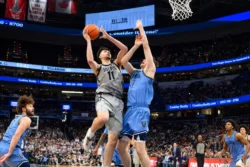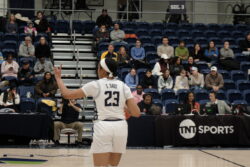When New York Giants General Manager Jerry Reese let Steve Smith and Kevin Boss walk away in free agency this offseason and cut Rich Seubert and Shaun O’Hara, both stalwarts on the offensive line, Giants fans were ready to declare the season dead and gone before the first snap. So, too, were the experts, who widely predicted a third or even last-place finish for Big Blue.
They just forgot about one Elisha Nelson Manning. Who could blame them? In his seventh season as an NFL quarterback, Manning threw 25 interceptions as the Giants failed to make the playoffs for a second straight season. Though all hope was seemingly lost, a few writers came out with hope for the Giants before the 2011 campaign kicked off, with KC Joyner noting that “Eli Manning wasn’t nearly as bad as his 2010 numbers suggest.”
As an unabashed Big Blue fan, I took solace in infrequent positive opinions, though the team’s similar circumstances in 2007 certainly had me excited about 2011. Keep in mind that during that season, New York was hit with the loss of tight end Jeremy Shockey to injury and the retirement of the franchise’s most prolific running back, Tiki Barber.
That 2007 season was a complete shocker, especially because Eli did not exactly impress during the regular season, with 23 touchdowns compared to an outrageous 20 interceptions. But, as former General Manager Ernie Accorsi noted when he scouted Manning during his days at Ole Miss, the quarterback had a “magic” about him, an ability to make his teammates better. Next thing NFL fans knew, Manning heaved it into the end zone to Plaxico Burress to beat the undefeated New England Patriots in arguably the most shocking Super Bowl in league history.
And so, with his second Super Bowl and subsequent MVP award under his belt, the question isn’t whether Eli is better than his brother Peyton, or even better than Tom Brady. The answer to those question remains a resounding and unequivocal no. The real question should be how long we, as fans, should wait to judge a quarterback’s legacy.
Today, almost any team choosing between Manning and his draft-day trade partner Philip Rivers, who side-armed his way to 20 interceptions in 2011, would ride with Eli. For some, though, that late-game mettle wasn’t apparent before 2007, or even before this Super Bowl. San Diego was held in notoriety for mismanaging quarterback Ryan Leaf, considered one of the biggest busts in NFL history. Much of the reason Eli refused to play for the Chargers is because of the horror stories Peyton conveyed about Leaf’s NFL upbringing.
But, for their handling of Leaf, the team certainly eased Rivers’ transition by allowing him to learn under Drew Brees for two seasons. The NFL’s best quarterback, Aaron Rodgers, learned in a similar manner under Brett Favre for three seasons.
Eli, meanwhile, was thrust into the spotlight for the Giants in the post-Kerry Collins era, replacing the franchise’s stopgap in Kurt Warner after he went down with a number of concussions. Since that time, Manning has started every game behind center for Big Blue. He did, however, experience his share of growing pains, certainly on a larger scale with respect to performing under the New York spotlight. The Jets’ Mark Sanchez suffers from that scrutiny today, as he was thrust into the starter role during his second NFL game. Just three seasons in, Gang Green fans are clamoring for his removal. And while Sanchez is no Manning, he remains a talented quarterback who still needs time to learn the intricacies and preparation methods of the game. Eli is not afraid to admit that he learns a great deal every season, apparent in his preparations and additionally with his brother’s other-worldly, almost robotic levels of studying.
Peyton, as another example, took quite some time to establish himself before starting his run of four MVP awards. Brees, meanwhile, was considered damaged goods after a shoulder injury ended his tenure in San Diego. Indianapolis exercised patience with Manning and New Orleans rolled the dice on Brees – both worked out historically well, leading their teams to Super Bowl victories.
Thus, as the NFL’s focus shifts from Eli Manning to his brother and the Andrew Luck situation, fans should be cognizant of what recent history shows. Very few quarterbacks are elite, but even if they are, it may take two Super Bowl rings for everyone else to take notice.





